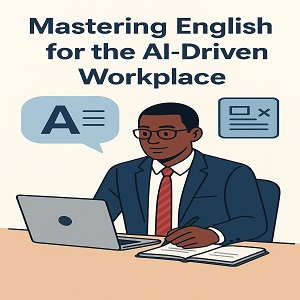Mastering English for the AI-Driven Workplace
 When I began teaching English two decades ago, most of my students shared the same goal: to master grammar and pass exams. They cared deeply about tenses, sentence structures, and vocabulary lists — and rightly so. Grammar still matters; it remains the backbone of clear communication.
When I began teaching English two decades ago, most of my students shared the same goal: to master grammar and pass exams. They cared deeply about tenses, sentence structures, and vocabulary lists — and rightly so. Grammar still matters; it remains the backbone of clear communication.
But in recent years, I’ve noticed a quiet but significant shift. My students — both university learners and young professionals — are no longer studying English only to score well in exams or to qualify for overseas programs. Increasingly, they are learning English to work effectively with technology, particularly artificial intelligence.
It’s a fascinating transformation. English has always been a global language for business and academia, but today, it has also become the language of AI interaction and digital productivity. As workplaces adopt AI tools to enhance efficiency, employees who can express their thoughts clearly and precisely in English are discovering an unexpected advantage: AI understands them better, and therefore performs better.
English: The Language of AI
Here’s something many people don’t realize — most of the world’s AI systems, including the most advanced ones, are trained primarily on English data. The vast majority of online information, academic papers, and corporate documents that feed these models are written in English.
That means when you interact with AI tools like ChatGPT, Claude, Gemini, or even AI-powered assistants in your workplace, English will always produce the best results — clearer, more nuanced, and more contextually accurate.
You can test this yourself: ask an AI to summarize a Hindi article, then ask it to summarize the English version of the same text. More often than not, the English summary will be sharper and more natural.
This is not about English being a “better” language. It’s about data. The more training data a model has in a language, the smarter it is in that language. English, being the global language of business, science, and the internet, dominates AI training datasets.
So, in a world where AI is becoming your new digital assistant, English is no longer just a communication skill — it’s a performance multiplier.
AI at Work: Speak Clearly or Get Left Behind
Modern companies have noticed this shift. Many now encourage — or even require — employees to use AI to boost productivity.
At BestKru English, the private tutoring company where I work, we use AI daily — to create lesson plans, generate marketing ideas, and even brainstorm new features. But here’s the interesting part: the results you get from AI depend entirely on how clearly you express yourself.
If you type a vague or poorly structured sentence, AI gives you vague or poorly structured answers. It’s a digital version of the saying: “Garbage in, garbage out.”
For example, a prompt like:
“Write something about online learning.”
…will get you a bland, generic answer. But if you write:
“Write a 300-word article explaining how online learning helps rural students access higher education opportunities in Southeast Asia.”
…you’ll get something much richer, relevant, and precise.
That’s not because the AI suddenly became smarter. It’s because you did. You communicated better.
And that’s exactly why English mastery is becoming the new “soft skill” that drives hard results. Employers aren’t just looking for people who know English anymore — they’re looking for people who can think in English, structure ideas clearly, and guide AI systems with precision.
Prompting: The New Communication Skill
I sometimes tell my students that writing prompts for AI is like talking to a very smart but very literal person. You need to be clear, concise, and specific. Otherwise, it misunderstands you — just like a real colleague might.
When I started tutoring English online, prompting wasn’t even a concept. Now, about one-third of my private students — from college students to working professionals — specifically ask me to include “AI English” or “prompt writing” practice in their lessons.
They’ve realized that good prompting is good communication. The same skills that make you a strong writer or speaker in English — clarity, structure, and tone — also make you effective with AI tools.
I’ve seen engineers, marketers, and teachers all struggle with this at first. They know what they want AI to do but can’t quite express it properly. Once they improve their English phrasing, the difference is astonishing. Suddenly, they get results that sound like they came from a professional team rather than a robot guessing in the dark.
So, when students ask me how to “get better at AI,” my answer surprises them:
“Start by getting better at English.”
Campus Lessons for a Digital Workplace
Universities and training institutes are catching on to this trend too. Some forward-thinking institutions in Thailand and India have started offering English for AI communication modules — combining traditional English lessons with AI-driven writing and analysis exercises.
These programs teach students how to:
- Structure prompts logically and hierarchically.
- Use tone and register appropriately (formal, creative, persuasive, etc.).
- Refine AI outputs using feedback loops in English.
- Critically evaluate whether an AI’s English output sounds natural or biased.
This kind of training doesn’t just build language skills — it builds critical thinking, a skill employers value even more in the AI era.
When companies ask for “strong communicators,” they increasingly mean:
“Someone who can make humans and AI understand what they want.”
Clear English = Smart AI
Let’s not forget the irony here. For decades, students asked, “When will I ever use English in real life?”
Well, here’s the answer: every time you open your laptop.
Whether you’re drafting an email, asking ChatGPT for help with data analysis, or generating content ideas, your English is quietly determining your AI’s intelligence.
The difference between “a lazy answer” and “a brilliant one” often lies in just a few words — how clearly you defined your question. That’s not just a language skill; that’s strategic communication.
So, the next time someone tells you English is just another subject, remind them:
“English is the operating system of AI.”
Author: Kamonwan Achjanis, former teacher, co-founder of Thai educational company BestKru
Profile:
Kamonwan Achjanis is the co-founder of BestKru, one of the largest EdTech companies in Thailand. She is working with hundreds of private teachers and tutors, advising them on how to improve the quality of teaching. Being involved in development of several education software projects, she has deep expertise in EdTech and teaching online.

